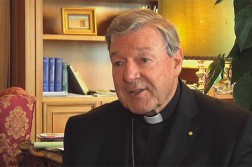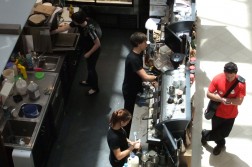When I was growing up, Fairfax was the symbol of all that was good and noble in the world. Every morning my chums and I would wait eagerly outside the newsagent’s, waiting for it to open so we could get our hands on the day’s paper. The journalists were as gods to us; we hung on their every word, and obsessively collected our Fairfax trading cards; a Michelle Grattan was worth two Mike Carltons, but the real prize, of course, was a mint-condition Leunig. We threw slumber parties and talked long into the night of our hopes of someday becoming subeditors.
They were heady days, when we thought anything was possible, and our dreams came in broadsheet format.
I suppose that, really, the loss of innocence began in 1990, when young scion Warwick Fairfax’s disastrous takeover of the company ended in humiliation and ritual slaughter. And yet, I was willing to hang on to the dream until now. Until Fairfax management decided to launch a tactical strike on its own people, sacking 550 of its staff in a purge that, without hyperbole, I think I can reasonably say equals anything seen in the heyday of Joseph Stalin.
The architect of this atrocity was Fairfax chief executive David Kirk, a man who has ruthlessly applied the skills learnt as All Black captain to the media industry, collapsing the maul of quality journalism before stomping on the prone heads of his employees. However, he should be aware that in his attempt to pass quickly from the scrumbase of advertising revenue to his shareholders at five-eighth, he has not inadvertently won a scrum against his own feed, with readers rejecting the lineout call of cost-cutting and turning to the quick tap of alternative media.
However, it will take more than inappropriate metaphors to unravel this mess. Many are blaming the ructions at Fairfax on former Rural Press CEO Brian McCarthy, who arrived when the two companies merged, and apparently has tried to impose the Rural Press culture on Fairfax. This is, clearly, an appalling development that needs to be nipped in the bud with all possible speed.
The Rural Press "culture", so-called, involves cost-cutting, downsizing of editorial teams, and pursuit of profits at the expense of quality. If it continues, however, the more sinister elements of Rural Press will begin to be seen at The Age and Sydney Morning Herald. Elements like weekly lawn bowls scores. Depressing pictures of farmers standing in fields moping over dirt. Cattle sale reports. Think about that: if Brian McCarthy’s reign of terror is allowed to proceed unchecked, our most respected daily newspapers will be swamped with endless prose about how firm the weaner market is. So let’s not laugh this off as just another vaguely amusing tale of people losing their livelihoods.
The affected staff, of course, have done their best to prevent catastrophe. They’ve voiced their protests long and loud, even going out on strike for several days, forcing management to briefly produce the papers themselves using Microsoft Word and the PocketNews service on their mobile phones. But sadly, it seems there’s little they can do about the situation. The jobs are gone, and they’re not coming back. Like Andrew Bolt with reality, Fairfax journos are fighting a losing battle. In fact, some commentators see it as a symptom of the demise of traditional media itself.
And when it comes down to it, is that necessarily such a bad thing? Let’s look at the bright side. If the "high-brow" Fairfax publications go the way of the dodo, there could be advantages. For one thing, we wouldn’t have to deal with those gigantic sheets of paper. A world without broadsheets, a world without awkward folding, a world without trying to read the paper on the train and accidentally elbowing the woman next to you in the face in a vain effort to get to page five. The decline of traditional media offers exciting new opportunities to those of us who wish to avoid the wild and bloody brawls that have become an inherent part of the daily commute. In fact, it is quite possible that the overcrowding of public transport is a crisis generated entirely by the excessive space taken up by Fairfax newspapers.
On the other hand, without traditional media, we will be more than ever in thrall to the bloggers. Our news experience will be reduced to a badly spelled nightmare, as debate over the value of the UN Security Council is relegated to a mere sidebar to the issues of how George Lucas raped our memories and whether vampires can find love.
So we see, we can neither totally discard the gravitas of traditional media nor completely ignore the compact charms of the digital world. What we really need is a synthesis, a way to bring the best of both worlds together. How can we do this? How can we devise a new media that will combine the hip, fresh funkiness of WayneSwan.com with the painstaking journalism and well-honed insight of Miranda Devine? Is such a thing even possible?
Frankly, I don’t know. I merely pose the questions, leaving the answers to those men of art and science eminently more qualified than I. But I do know that we need to see the Fairfax redundancies as a warning. If we ignore it; if we keep on producing the news in the same old way; if we allow ourselves to be lulled to complacency by the seductive charms of Robert Manne and Kenneth Davidson; if we shrug our shoulders and say, "it’s just news, who cares, don’t worry about it, I feel sleepy, let’s go lie down for a bit"; if we let this happen, our very democracy is at stake.
It may not seem to affect you in any direct way if our news outlets cease to be repositories of revelation and truth and instead become tawdry hotbeds of mindless gossip and numbing cross-promotion, but sooner or later, we will feel the harsh sting of fascism, as we lose our grip on the world around us and the forces of darkness control us like marionettes with weight-loss tips and Jennifer Hawkins.
Remember citizens: first they came for Carlton. Then they came for me.
Donate To New Matilda
New Matilda is a small, independent media outlet. We survive through reader contributions, and never losing a lawsuit. If you got something from this article, giving something back helps us to continue speaking truth to power. Every little bit counts.



